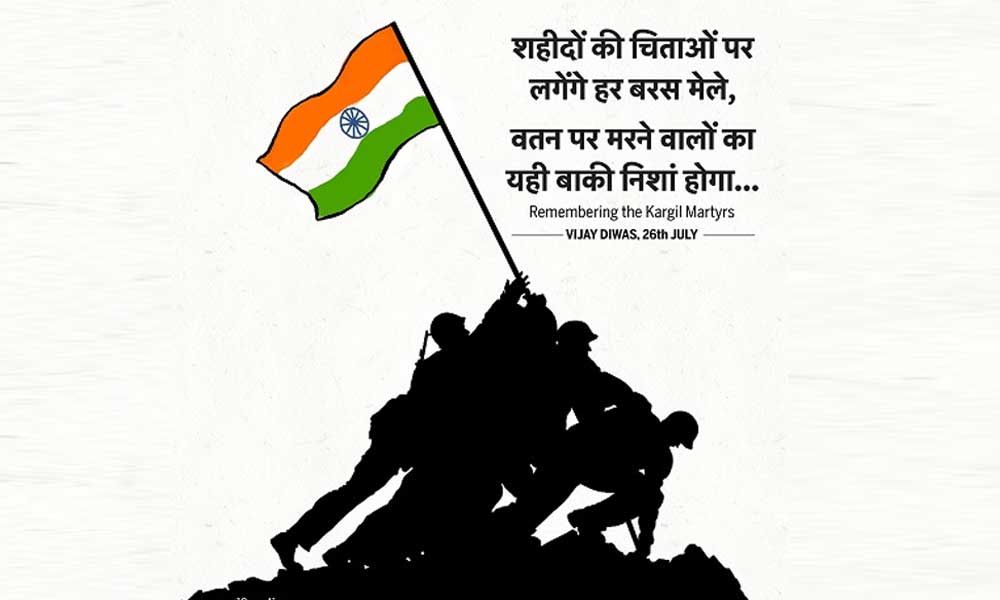Live
- Hrithik Roshan reflects on legacy and inspiration
- Dhivyabharathi promises an unforgettable experience with ‘Kingston’
- India remains a bright spot in global GDP growth trajectory: Economists
- Director Kiruthiga Udhayanidhi encourages actors to embrace bold roles
- ‘Fateh’ review: Feast to action lovers
- Samantha overcomes health setbacks; shares updates on social media
- Kejriwal swindled Rs 2,026 cr through liquor scam, shows CAG report
- Angola reports 119 cholera cases, including 12 deaths
- Splash Colors Media, Alinea Avighna Studios, and Settle King Begin Shooting for Production No. 1
- South Korea: Black boxes of crashed Jeju Air plane missing final four minutes of data
Just In
A Battle to be Remembered: Proud Nation recalls the courage of the Armed Forces on Kargil Vijay Diwas ' 20th anniversary


Kargil Vijay Diwas ' 20th Anniversary is being celebrated today. India honors the Bravehearts.
Kargil Vijay Diwas ' 20th Anniversary is being celebrated today. India honors the Bravehearts. The day marks the win of Indian armed forces in Operation Vijay in 1999, when they expelled Pakistani-backed infiltrators and regained control of the Kargil sector's elevated outposts.
For more than 60 days, the Kargil war was fought and ended with India regaining control of all the territory previously held. This year's celebrations ' main theme is' Remember, Rejoice and Renew.' On the occasion, at Chinar Corps Headquarters, Badamibag in Srinagar, President Ram Nath Kovind, who is also the Supreme Commander of the armed forces, paid tributes. The previous program of the President of paying homage to war soldiers at Dras was canceled due to bad weather.
Prime Minister Narendra Modi additionally paid tributes to the daring officers of Indian Army who set out their lives ensuring their country. In a tweet, he stated, the day helps us to remember the fearlessness, valiance, and commitment of our officers.
#WATCH: Union Defence Minister Rajnath Singh lights the 'Victory Flame' from National War Memorial in Delhi, which would traverse through 11 towns and cities to finally culminate at Drass where the flame will be merged with the eternal flame at the 'Kargil War Memorial'. pic.twitter.com/LtsIMsB5Qa
— ANI (@ANI) July 14, 2019
The Prime Minister likewise shared on twitter a few photos of his Kargil visit in 1999 and portrayed his association with troopers as remarkable. He stated, during the Kargil War, he had the chance to go to Kargil and show solidarity with valiant officers. Mr. Modi stated, he was working for his Party in Jammu and Kashmir just as Himachal Pradesh around then.
Protection Minister Rajnath Singh, three administration boss alongside three Service Vice Chiefs paid reverence to Kargil Soldiers by laying a wreath at National war commemoration in New Delhi. The festivals of twentieth Anniversary of Kargil Vijay Diwas started in Delhi on fourteenth of this current month. The Victory Flame navigated through eleven towns and urban areas lastly came to Dras.
At Drass, the triumph fire was gotten from Major DP Singh and passed on to Param Veer Chakra awardee Yogendra Yadav and afterward to Army Chief Bipin Rawat to converge at Kargil War Memorial with endless fire.
Principle festivities have been spread more than three days starting yesterday. A Commemoration Ceremony is being sorted out at the Manekshaw Center in New Delhi, where a board dialog with the war veterans and serving officials will be directed. The occasion will be trailed by Kargil Vijay Diwas Evening, a social event, at the Indira Gandhi Indoor Stadium tomorrow.
HISTORY:
After the 1971 Indo-Pakistan War, there was a lengthy period of comparatively few direct armed clashes involving the two neighbors ' military forces – despite the attempts of both countries to regulate the Siachen Glacier by setting up military outposts on the adjacent hills and the ensuing military skirmishes in the 1980s.
During the 1990s, notwithstanding, heightening pressures and struggle because of dissident exercises in Kashmir, some of which were bolstered by Pakistan, just as the leading of atomic tests by the two nations in 1998, prompted an undeniably pugnacious air. While trying to defuse the circumstance, the two nations marked the Lahore Declaration in February 1999, promising to give a serene and reciprocal answer for the Kashmir strife.
During the winter of 1998–99, some elements of the Pakistani Armed Forces were covertly training and sending Pakistani troops and paramilitary forces into territory on the Indian side of the control line (LOC), some allegedly in the guise of Mujahideen.
The code called "Operation Badr" was the infiltration. The point of the Pakistani invasion was to cut off the connection among Kashmir and Ladakh and cause Indian powers to pull back from the Siachen Glacier, in this manner driving India to arrange a settlement of the more extensive Kashmir debate. Pakistan likewise accepted that any strain in the district would internationalize the Kashmir issue, helping it to verify rapid goals.
One more objective may have been to help the resolve of the decade-long disobedience in the Indian State of Kashmir by playing a genius dynamic job. The Indian troops in the region initially thought that the infiltrators were jihadis, with little knowledge of the nature or magnitude of the infiltration, and stated that they would evict them within a few days.
Following the discovery of infiltration elsewhere along the LOC, together with the distinction in tactics employed by the infiltrators, the Indian army realized that the plan of attack was on a much bigger scale. The total area seized by the ingress is generally accepted to between 130 km² – 200 km².
India's government reacted with Operation Vijay, a 200,000 Indian troop mobilization. On July 26, 1999, the war officially ended, marking it as Kargil Vijay Diwas. 527 Indian Armed Forces troops lost their lives in the conflict.

© 2025 Hyderabad Media House Limited/The Hans India. All rights reserved. Powered by hocalwire.com






